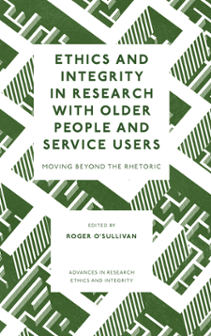
Index
Ethics and Integrity in Research with Older People and Service Users
ISBN: 978-1-80455-423-4, eISBN: 978-1-80455-422-7
ISSN: 2398-6018
Publication date: 24 November 2023
Citation
(2023), "Index", O'Sullivan, R. (Ed.) Ethics and Integrity in Research with Older People and Service Users (Advances in Research Ethics and Integrity, Vol. 9), Emerald Publishing Limited, Leeds, pp. 201-205. https://doi.org/10.1108/S2398-601820230000009013
Publisher
:Emerald Publishing Limited
Copyright © 2024 Roger O’Sullivan. Published under exclusive licence by Emerald Publishing Limited
INDEX
- Prelims
- Section 1 ‘Views From the Researchers’
- Chapter 1 Theory and Practice of User-Involved Research
- Chapter 2 Navigating Person-Centred Ethics: A Sensory Ethnographic Study Involving Older People Living With Dementia and Family Carers
- Chapter 3 Incorporating Older Adult Voice Into Meaningful Research – ‘It's About Time’
- Chapter 4 Family Conflict in Dementia Caregiving: Maintaining Research Ethics and Integrity
- Chapter 5 Ethical Issues in Research With Vulnerable People: A Case Study
- Section 2 ‘Views From the Researched’
- Chapter 6 Involving Lay Members of the Public in Research – Reflections and Insights
- Chapter 7 Ethics, Integrity and Co-production in Mental Health Research
- Section 3 ‘Views From Those Who Fall In Between’
- Chapter 8 Research With Older Adults in American Indian Communities – Understanding Knowledge, Power and Practice
- Chapter 9 Engaged Research as Team Science Reflections From the ‘Researcher’ and the ‘Researched’
- Chapter 10 Trying the Patience of Patients: A Personal Reflection
- Appendix
- Further Reading and Resources
- Glossary
- Index